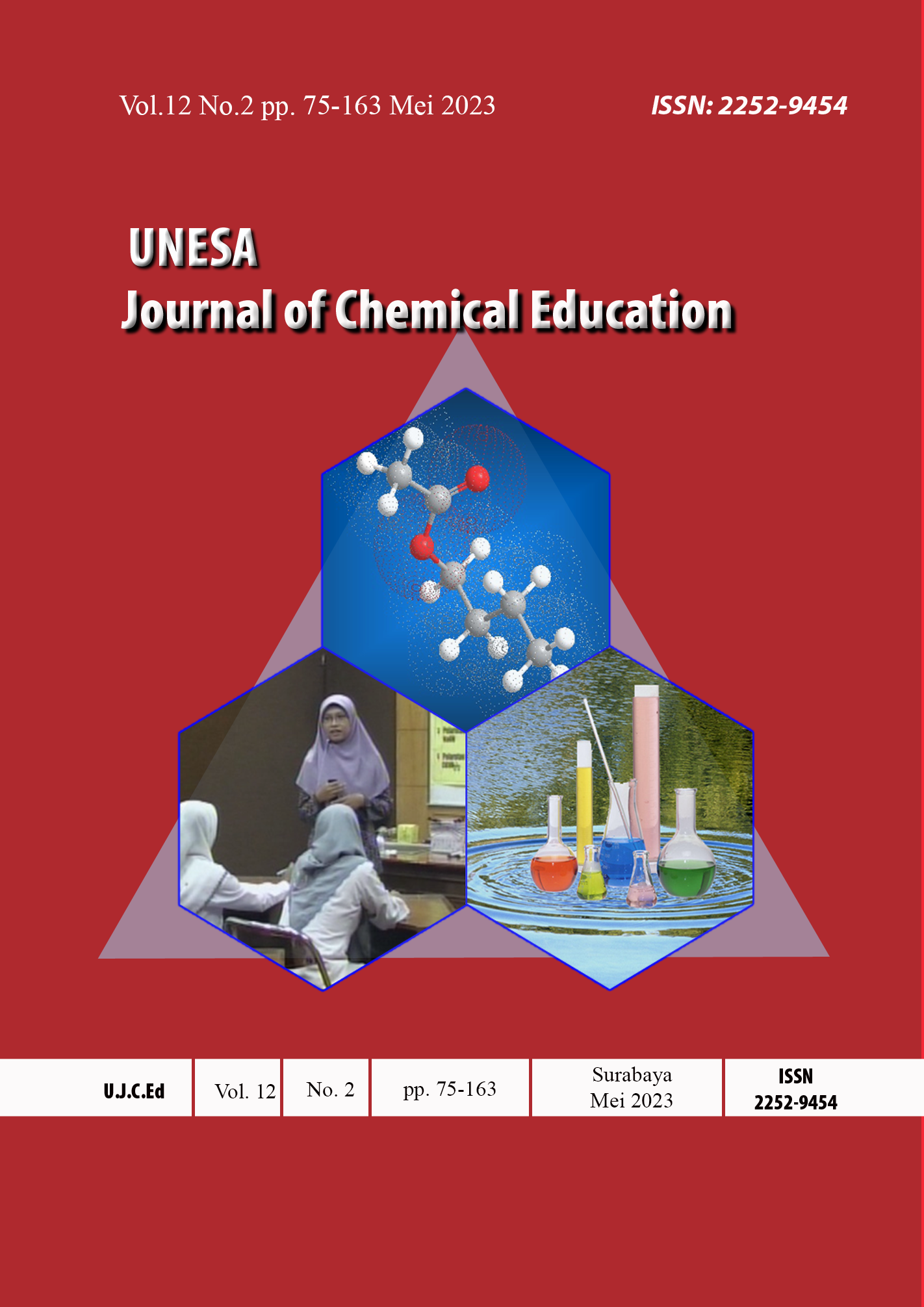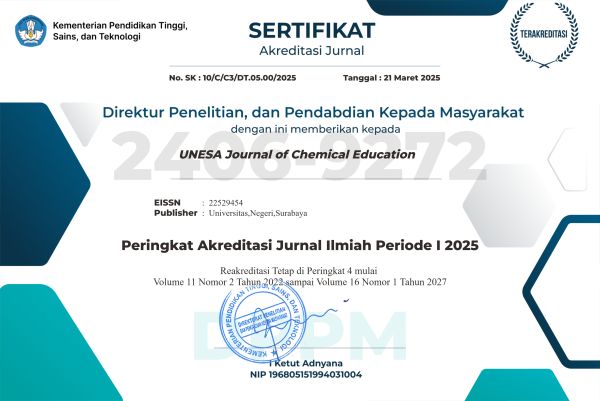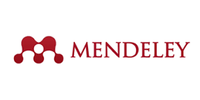THE EFFECTIVENESS STAD COOPERATIVE LEARNING MODELS ON CRITICAL THINKING ABILITY AND STUDENT LEARNING OUTCOMES ON CHEMICAL EQUILIBRIUM
DOI:
https://doi.org/10.26740/ujced.v12n2.p132-140Keywords:
student teams achievement divisions, critical thinking ability, learning outcome, chemical equilibriumAbstract
Empirical research has informed that chemical equilibrium learning in chemistry class includes as a difficult subject for senior high school students, and the learning approach that can challenge this complexity in the Indonesian schooling context seems sparse. Therefore, this present study was designed to find out: (1) the implementation of STAD learning model in the chemistry class discussing chemical equilibrium topic and (2) the differences in the ability to think critically and learning outcomes of Indonesian senior high school students after being taught using STAD and conventional learning models. To collect and analyze the data, Posttest Only Control Design was employed. Findings suggested that (1) the implementation of STAD learning model had an average of 93% and conventional learning of 90%, (2) there are differences in the critical thinking abilities of students who were taught using STAD model (86.14%) higher than those taught using conventional learning model (71.14%), and (3) there are differences of students who were taught using STAD model (86.00%) higher than those taught using conventional learning model (81.76%). Based on these results, we can infer that STAD learning model could enhance students’ critical thinking abilities and learning outcomes effectively.
Downloads
References
Adaminata, M. A. dan Marsih, I. N. 2011. Analisis Kesalahan Konsep Siswa SMA pada Pokok Bahasan Kesetimbangan Kimia. Prosiding Simposium Nasional Inovasi Pembelajaran dan Sains.
Ahyar, l. M., Ibnu, S. dan Affandy, D. 2017. Penerapan Stad Dalam Pembelajaran Inkuiri Terbimbing Dan Pengaruhnya Terhadap Hasil Belajar Peserta Didik. J-PEK (Jurnal Pembelajaran Kimia). Vol. 2. No. 1.
Choy, S. C. dan Cheah, P. K. 2009. Teacher Perceptions of Critical Thinking Among Students and its Influence on Higher Education. International Journal of Teaching and Learning in Higher Education. Vol. 20. No. 2.
Effendy. 2016. Ilmu Kimia Untuk Siswa SMA dan MA Kelas X Jilid 1A. Malang: Indonesian Academic Publishing.
Ennis, R. H. 2013. The Nature of Critical Thinking: An Outline of Critical Thinking Disposition and Aboloties. University of Illinois.
Ennis, R. H. 2013. Critical thinking across the curriculum (CTAC).
Ennis, R. H. 2015. The Nature of Critical Thinking: Outlines of General Critical Thinking Disposition and Abilities. MIT, Cambrigde: Presentation at Sixth International Conference on Thinking.
Indriani, A., Suryadharma, I. B. dan Yahmin, Y. 2017. Identifikasi Kesulitan Peserta Didik Dalam Memahami Kesetimbangan Kimia. J-PEK (Jurnal Pembelajaran Kimia). Vol. 2. No. 1.
Talanquer, V. 2006. Commonsense Chemistry: A Model for Understanding Students’ Alternative Conceptions. Journal of Chemical Education. Vol. 83. No. 5.
Suyono, H. 2014. Belajar dan Pembelajaran: Teori dan Konsep Dasar. Bandung: Remaja Rosdakarya.
Surayya, L., Subagia, I. W. dan Tika, I. N. 2014. Pengaruh Model Pembelajaran Think Pair Share terhadap Hasil Belajar IPA Ditinjau dari Keterampilan Berpikir Kritis Siswa. Jurnal Pendidikan dan Pembelajaran IPA Indonesia. Vol. 4. No. 1.
Nafiah, Y. N. dan Suyanto, W. 2014. Penerapan model problem-based learning untuk meningkatkan keterampilan berpikir kritis dan hasil belajar siswa. Jurnal Pendidikan Vokasi. Vol. 4. No. 1.
Subhan, P. dan Salempa, M. D. 2018. Pengaruh Media Animasi dalam Model Pembelajaran Inkuiri Terbimbing terhadap Keterampilan Berpikir Kritis dan Aktivitas Belajar Peserta Didik Pada Materi Kesetimbangan Kimia. Chemistry Education Review (CER). Vol. 1. No. 2.
Jusniar, J., Effendy, E., Budiasih, E. dan Sutrisno, S. 2020. Developing a three-tier diagnostic instrument on chemical equilibrium (TT-DICE). Educación Química. Vol. 31. No. 3.
Nugrahaeni, A., Redhana, I.W. dan Kartawan, I. M. A. 2017. Penerapan Model Pembelajaran Discovery Learning untuk Meningkatkan Kemampuan Berpikir Kritis dan Hasil Belajar Kimia. Jurnal Pendidikan Kimia Indonesia. Vol. 1. No. 1.
Felder, R. M. dan Brent, R. 2005. Effective Strategies for Cooperative Learning. Journal of Cooperation & Collaboration in College Teaching. Vol. 10. No. 2.
Hamdayana, J. 2016. Metodologi pengajaran. Jakarta: Bumi Aksara.
Ling, W. N., Ghazali, M. I. dan Raman, A. 2016. The Effectiveness of Student Teams Achievement Division (STAD) Cooperative Learning on Mathematics Comprehension Among School Students. Internasional Journal of Advanced Research and Development. Vol. 1. No. 3.
Van Wyk, M. M. 2013. The Effect of Student Teams Achievement Divisions as a Teaching Strategy on Grade 10 Learners’ Economics Knowledge. International Journal for Cross-Disciplinary Subjects in Education. Vol. 4. No. 2.
Van Wyk, M. M. 2012. The Effects of the STAD-Cooperative Learning Method on Student Achievement, Attitude and Motivation in Economics Education. Journal of Social Sciences. Vol. 33. No. 2.
Slavin, R. E. 2005. Cooperative Learning. Bandung: Nusamedia.
Khalistyawati, M. dan Muhyadi, M. 2018. Pengaruh Model STAD dan Jigsaw Terhadap Karakter Kerja Sama, Kemampuan Berpikir Kritis, dan Hasil Belajar Kognitif. Jurnal Pendidikan Karakter. Vol. 9. No. 2.
Tiantong, M. dan Teemuangsai, S. 2013. Student Team Achievement Divisions (STAD) Technique through the Moodle to Enhance Learning Achievement. International Education Studies. Vol. 6. No. 4.
Saputro, A. D., Rohaeti, E. dan Prodjosantoso, A. K. 2018. Promoting critical thinking and Problem Solving Skills of Preservice Elementary Teachers through Process-Oriented Guided-Inquiry Learning (POGIL). International Journal of Instruction. Vol. 11. No. 4.
Romanowski, M. H. dan Nasser, R. 2012 Critical Thinking and Qatar’s Education for a New Era: Negotiating Possibilities. The International Journal of Critical Pedagogy. Vol. 4. No. 1.
Sugiyono. 2017. Metode Penelitian Kuantitatif, Kualitatif, Dan R&D. Bandung: Alfabeta.
Dewi, D. T. K. 2019. Pengaruh Tingkat Pendidikan Orang Tua Terhadap Motivasi Belajar Siswa Di Sd Negeri Winong Mirit Kebumen. Doctoral dissertation, IAIN.
Downloads
Published
Issue
Section
License
The license terms of the Creative Commons Attribution-NonCommercial 4.0 International (CC BY-NC 4.0) requires attribution to the original creator, permits non-commercial use, and does not allow for the application of legal or technological restrictions on others' use.
 Abstract views: 133
,
Abstract views: 133
, PDF Downloads: 142
PDF Downloads: 142













